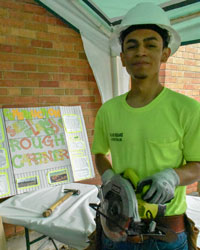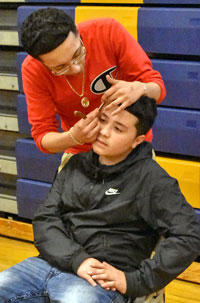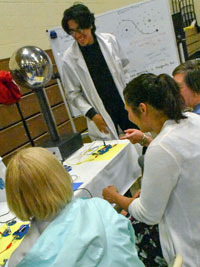The Thursday evening before graduation, Lee High School was abuzz with activity as 84 seniors — nervous, excited and anxious to finish the school year — presented their capstone projects to panels of volunteer judges.
Tables with posters, props, activities and refreshments lined areas of the building, and at each table stood a senior, ready to present on a trade or career they had researched over the last few months as part of their senior capstone.

Just outside the gymnasium entrance, Joaquin Hernandez gave the judges assembled at his table an idea of what it takes to rough frame a window, and had them assemble a frame in puzzle-like fashion, to share with them his post-graduation plans to work in construction.
Inside the gym, senior Melissa Montiel caught up with Chris Gill, a Godfrey Elementary teacher who had taught Melissa in fourth and fifth grades. Melissa told Gill of her plans to become a social worker, inspired by what she has seen given the large immigrant population in her school district.
“I think it’s really important to protect the bonds that families need to have,” said Melissa, who plans to attend Grand Rapids Community College this fall, then transfer to a four-year school.
Gill said she tries to come to capstone night every year.
“I like to come back and see my former students and see how they’ve grown. It’s exciting to see what they’re going to do with their lives.”

A Seventh C: Capstone
Jody Hankis-Snyder is the lead teacher and coordinator for the capstone class, teaching two classes, while teachers Brian Cahoon and Pete Foote each teach one class.
Hankis-Snyder said the three-month capstone class began in the early 2000s, when now-retired Superintendent David Britten invited some teachers to attend Sparta’s capstone event. Godfrey-Lee then began having seniors research a career, write a short paper and develop a portfolio to present in the classroom. That assignment evolved into its current format.
Each step of the capstone is tied to one of the 6 Cs embraced by the district: collaboration, communication, content, critical thinking, creative innovation and confidence. For example, students design a hands-on component for judges to show collaboration, while confidence is necessary for the presentation itself, said Hankis-Snyder.

The capstone also requires students to write an essay, create a website and interview mentors in their chosen field.
This exhibition marked the fourth year of attendance for Carol Paine-McGovern, executive director of Kent School Services Network, who volunteered to evaluate some of the student presentations.
Paine-McGovern sat in on presentations for an aspiring physician assistant and pediatric nurse.
“For me, the biggest takeaway was really seeing the increase in the folks that are interested in medicine as well as some professions I hadn’t seen before: software development and a lot of them related to food.”
This year, judges received links to web pages students created to provide information about themselves and their ambitions. This was the first year that was done, and Paine-McGovern said it was very helpful to get to know a little bit about the students before hearing them present.

One More C: Coordination
The event is a highly-coordinated and planned undertaking: each student presented their capstone three times throughout the evening, and judges were scheduled for each time slot. The media center became a spot for judges to grab dinner catered by Tamales Mary and fill out student evaluations.
So how does the school pull off the big event? By relying on students.
“Basically, I’ve been planning this since I was a freshman,” said senior Crystal Gonzalez. “The event is my capstone project.”

Crystal has been involved in the exhibition all four years of high school, taking photos and video, fundraising and finally, serving as senior coordinator for the event. She enlisted the help of about 30 juniors to set up, greet visitors, direct traffic and serve refreshments for the big night, which carries a lot of weight for seniors.
“This is the make it or break it deal — if you pass it, then you’re fine, you’ve crossed the finish line, and you get to graduate. If not, you have to make up some credit for it or you get another chance to present,” Crystal explained.
While many students will change their minds about their post-college path, Crystal noted, the capstone provides a great opportunity to research and present a plan. While she wants to be a teacher and not an event planner, she sees crossover between the organization, planning and communication it took to coordinate the exhibition and the skills needed to manage a classroom.
















